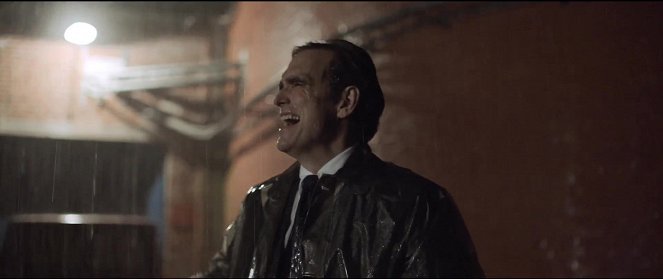Rendező:
Lars von TrierForgatókönyvíró:
Lars von TrierOperatőr:
Manuel Alberto ClaroZeneszerző:
Víctor ReyesSzereplők:
Matt Dillon, Bruno Ganz, Uma Thurman, Siobhan Fallon Hogan, Sofie Gråbøl, Riley Keough, Jeremy Davies, Jack McKenzie, Mathias Hjelm, Ed Speleers (több)Tartalmak(1)
A hetvenes-nyolcvanas évek Amerikájában követjük Jack (Matt Dillon), a sorozatgyilkos öt gyilkosságának történetét. A kiemelkedő intelligenciájú férfi maga mesél a tizenkét év leforgása alatt megtörtént, tetszőlegesen kiválasztott rémtetteiről, sorozatgyilkossá érésének állomásairól. Az epizódok között társa a beszélgetésben Verge, vagyis Vergilius (Bruno Ganz), amely utalás Dante Isteni színjátékában az alkotót a Pokolba kalauzoló költőre. (Vertigo Média)
(több)Videók (5)
Recenziók (7)
Trier itt úgy lépi át az elfogadhatóság határát, mint eddig még soha, de ismét (valószínűleg) megússza a sajátos művészi keretezésnek köszönhetően. Vagy egyszerűen csak figyelmen kívül hagyják, mint egy teljesen felejthető valakit. Ezt a filmet szeretni az jelenti, olyannak lenni mint Jack. Ezt nem akarod. Művészi kvalitásainak elismerése pedig inkább póz, mint tudás és nyitottság. Bár ki tudja, hogy Jack végül a jelen évszázad számára modern kori verziója lesz-e a Henry - egy sorozatgyilkos portréja filmnek. — A vadászati szegmens, amely a legmesszebbre megy, paradox módon órákkal később is a legérdekesebb tűnik, karikatúraszerű absztraktsága miatt. Ilyet senki sem tud komoly arccal megcsinálni a mainstreamben, bármennyire is nem akar másnak látszani. [Cannes]
()
Despite the violence, this is one of Trier’s most approachable films, one where the symbolism and the controversy are replaced by pragmatism and black humour, and yet I really don’t know what I’m supposed to get from it. The arthouse approach results in a stylisation of the violence, which is still quite brutally carried out, even on children, and following only the mind and thought processes of a murderous freak turns The House That Jack Built into nothing but an irritating, wannabe intellectual pose. At times it’s entertaining and the narrative concept is effective in the end, but what can I do with that when I there’s nothing that would make me enjoy the story subjectively. Maybe it’s a brilliant testimony of modern society, time will tell, but I don’t believe things are that bad in the world. Overall, I didn’t get bored, thanks to the brilliant Dillon and the many amazing ideas, but it missed me by a long shot.
()
I would describe The House That Jack Built as the blackest comedy I’ve ever seen. It can’t be taken seriously, though. During the viewing, emotions oscillate between ‘this Trier is such a master’ and ‘this Trier is such a ratbag’. I’ve just been slightly put off by the ending, but the rest was all fine. [Sitges 2018]
()
Stand by Lars. A manifestation of misogyny, authorial anxiety, provocation and self-defense. A therapeutic happening, which demonstrates, using the example of a murderous human caricature, what it is like when a filmmaker finds himself in a personal cleansing and the only path leading forward is to hell. I wasn't irritated by the fact that Lars crosses the boundary and makes fun of the taboo (almost every boundary thus broken is defended and relativized by Jack himself in voice over). However, I was rather annoyed that the film did not really shake me and manipulate the traditional Trier rudeness. But the more time that passed for me since the screening, the more I have to acknowledge some form of cleansing and irresistible compulsiveness that The House That Jack Built brings. And I was laughing at the cut scenes with Speer and Hitler. This is truly beyond good and evil. I like the bloated Danish castaway there the most. BTW, don't be fooled by the attractive subtitles. The reception at Cannes was quite warm. Probably because most haters left the hall during the scene with the children.
()
Lars Von Trier is a controversial director like David Lynch, and his previous work has so far passed me by, so I'm pleasantly surprised with his new film, which, although again not for mainstream audiences, uses an attractive theme that reminds me of the classic Henry: Portrait of a Serial Killer. Matt Dillon plays Jack with grace and deserves academic accolades for his performance. The film describes five incidents where Jack mercilessly murders and it definitely gives you uneasy feelings because what he does to his victims is beyond belief. The brutality is solid, but there were a few scenes where I was hoping Trier would go further, for instance the fifth incident and the full metal jacket experiment were woefully underused. It's two and a half hours long, but I didn't get bored and I enjoyed Jack's intelligent philosophising, from which I even learned something interesting, though Dante's Inferno at the end may have been too much. A disturbing, raw, smart and psychologically challenging film featuring black humour and sarcasm and I enjoyed it. 80%
()



Hirdetés